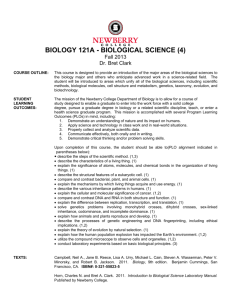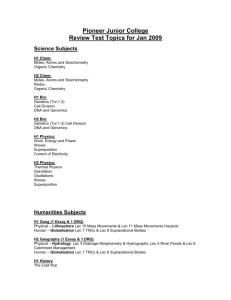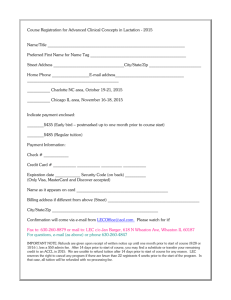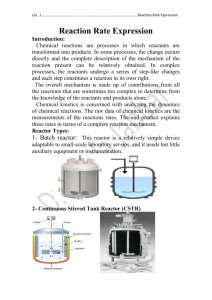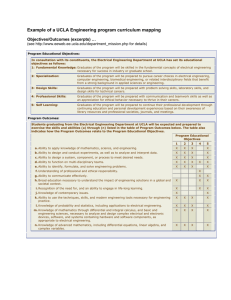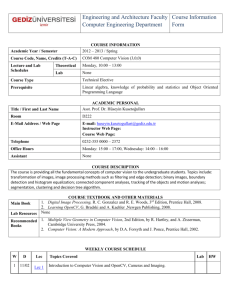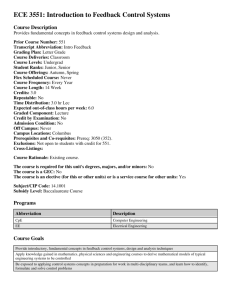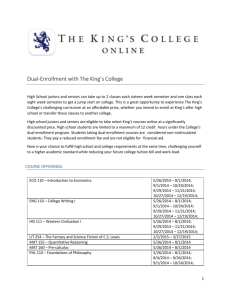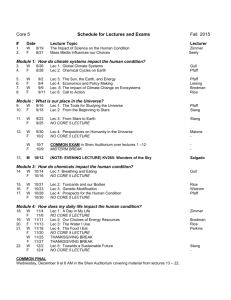biology 212b – microbiology (4) - Newberry
advertisement
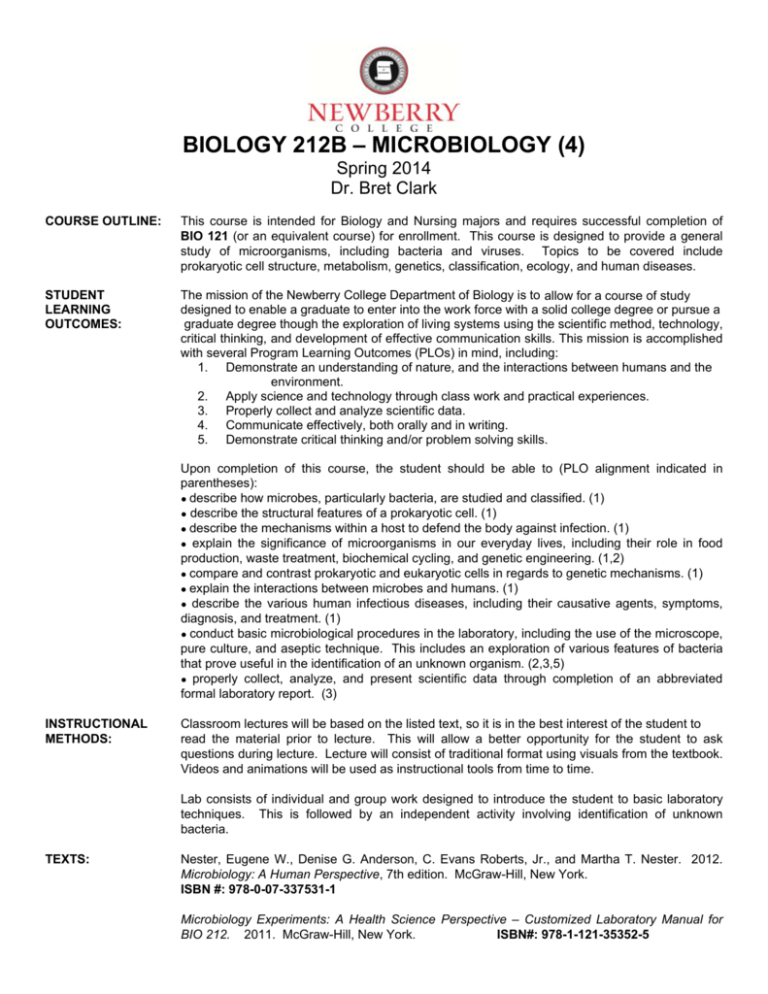
BIOLOGY 212B – MICROBIOLOGY (4) Spring 2014 Dr. Bret Clark COURSE OUTLINE: This course is intended for Biology and Nursing majors and requires successful completion of BIO 121 (or an equivalent course) for enrollment. This course is designed to provide a general study of microorganisms, including bacteria and viruses. Topics to be covered include prokaryotic cell structure, metabolism, genetics, classification, ecology, and human diseases. STUDENT LEARNING OUTCOMES: The mission of the Newberry College Department of Biology is to allow for a course of study designed to enable a graduate to enter into the work force with a solid college degree or pursue a graduate degree though the exploration of living systems using the scientific method, technology, critical thinking, and development of effective communication skills. This mission is accomplished with several Program Learning Outcomes (PLOs) in mind, including: 1. Demonstrate an understanding of nature, and the interactions between humans and the environment. 2. Apply science and technology through class work and practical experiences. 3. Properly collect and analyze scientific data. 4. Communicate effectively, both orally and in writing. 5. Demonstrate critical thinking and/or problem solving skills. Upon completion of this course, the student should be able to (PLO alignment indicated in parentheses): ● describe how microbes, particularly bacteria, are studied and classified. (1) ● describe the structural features of a prokaryotic cell. (1) ● describe the mechanisms within a host to defend the body against infection. (1) ● explain the significance of microorganisms in our everyday lives, including their role in food production, waste treatment, biochemical cycling, and genetic engineering. (1,2) ● compare and contrast prokaryotic and eukaryotic cells in regards to genetic mechanisms. (1) ● explain the interactions between microbes and humans. (1) ● describe the various human infectious diseases, including their causative agents, symptoms, diagnosis, and treatment. (1) ● conduct basic microbiological procedures in the laboratory, including the use of the microscope, pure culture, and aseptic technique. This includes an exploration of various features of bacteria that prove useful in the identification of an unknown organism. (2,3,5) ● properly collect, analyze, and present scientific data through completion of an abbreviated formal laboratory report. (3) INSTRUCTIONAL METHODS: Classroom lectures will be based on the listed text, so it is in the best interest of the student to read the material prior to lecture. This will allow a better opportunity for the student to ask questions during lecture. Lecture will consist of traditional format using visuals from the textbook. Videos and animations will be used as instructional tools from time to time. Lab consists of individual and group work designed to introduce the student to basic laboratory techniques. This is followed by an independent activity involving identification of unknown bacteria. TEXTS: Nester, Eugene W., Denise G. Anderson, C. Evans Roberts, Jr., and Martha T. Nester. 2012. Microbiology: A Human Perspective, 7th edition. McGraw-Hill, New York. ISBN #: 978-0-07-337531-1 Microbiology Experiments: A Health Science Perspective – Customized Laboratory Manual for BIO 212. 2011. McGraw-Hill, New York. ISBN#: 978-1-121-35352-5 COURSE SCHEDULE: Lecture: Lab OFFICE HOURS: Tu,Th 12:15-1:30pm Tu,Th 1:40-2:55pm Room SM 219, (803) 321-5255 bret.clark@newberry.edu Visit my website at www.newberry-college.net/bclark INFORMATION TECHNOLOGY: Room SM 206 Room SM 216 M 8-9:00am; 12-1:00pm Tu,Th 10:50am-12:15pm W 8-9:00am; 11:00am-1pm F 8-9:00am; 11:00am-12noon or by appointment Through Wolf Den, all students have free access to Microsoft 365 that provides functionality equivalent to the latest version of Microsoft Office such as Word, Excel and PowerPoint. Also included is a free service called “SkyDrive,” where students can securely store all documents. A student’s Wolf Den account, as well as Microsoft 365 and SkyDrive, can be accessed by virtually any network-capable computer on or off campus. To meet Program Learning Outcomes for the academic year 2013-14 and to provide access to technology, students in the Department of Science and Mathematics (Biology, Chemistry, Mathematics, Environmental Science, Forensic Science, Computer Science, Physics) will be required to use a computer with a minimum operating environment of Windows 7 and Microsoft Office 2010 or 2013 (including Word, PowerPoint, Excel). CACP CREDIT: All students wishing to graduate from Newberry College are required to participate in the Communications Across the Curriculum Program (CACP) by showing the ability to write papers at three levels. The written laboratory report that you prepare for lab 10 in this class (Temperature Requirements for Microbial Growth) can be submitted for level 2 credit. The final draft of this paper must be submitted to the CACP office by the last day of classes this semester. ATTENDANCE: If a student is not physically present in class, the student will be marked “absent.” Absences in excess of 15% of the total lecture and laboratory sessions will result in a letter grade deduction in your final grade. Further absences beyond this may result in a grade of FA (failure due to absences). Please note that this means you can only miss nine total lecture and/or lab sessions! Tardiness interrupts the class and will not be tolerated. A tardiness policy will be enforced (3 tardies = 1 absence). EMERGENCY SITUATIONS: The College could be closed because of weather (hurricane, tornado, snow/sleet), a pandemic (worldwide or localized disease outbreak), or other situations. Please visit the following Newberry College web page frequently for updated information and instructions: Home>Policies>Emergency Management In case of a pandemic, students should take appropriate personal preventive measures to avoid contracting influenza and other communicable diseases, minimize personal contact with others when feeling ill, and follow instructions of Newberry College administration/Health Services Center personnel as provided in the following link: Home>Campus Life>Student Services>Health Services Individual students who are sick should notify course faculty of their illness as soon as possible to develop a plan for completion of course requirements within the timeframe of the course. If students are quarantined and therefore unable to attend class or if face-to-face classes are cancelled because of a pandemic emergency, students in this class will follow the course outline and complete the reading and other assignments as posted on Wolf Den. In case of a pandemic or other major emergency, all instructional communications will take place via Wolf Den and email. -----------------------------------------------------------------------------------------------------------------------------------------------------------------BIO 212 - COURSE SCHEDULE -----------------------------------------------------------------------------------------------------------------------------------------------------------------Week of Topic Text Chapters 6 Jan Lec: Course Introduction 13 Jan Lec: Introduction to Microorganisms Lab: Ubiquity of Microorganisms; Microscopy 1 labs 1&3 20 Jan Lec: Prokaryotic Cell Structure Lab: Staining 3 labs 5&6 27 Jan Lec: Bacterial Growth Lab: Pure Culture and Aseptic Technique; Media 4 labs 2&7 3 Feb Lec: Skin and Wound Infections; Bacterial Metabolism Lab: Control of Microbial Growth with UV Light 22-23; 6 lab 12 10 Feb Lec: Genetics Lab: Bacterial Genetics 7-8 handout 17 Feb Lec: Genetics (cont’d) Lab: Chemical Control of Microbial Growth 8-9 lab 14 24 Feb Lec: Control of Microbial Growth; Antimicrobial Medicine Lab: Oxygen and Temperature Requirements for Bacterial Growth 5,20 labs 9&10 3 Mar NO CLASSES – SPRING BREAK 10 Mar Lec: Blood Infections; Nervous System Infections Lab: Effects of Osmotic Pressure and pH on Bacterial Growth 27,26 handout 17 Mar Lec: Classification/Identification of Bacteria Lab: Quantification of Microorganisms 10-11 lab 8 24 Mar Lec: Environmental Microbiology; Microbiology of Food and Water Lab: Preparation of Stock Cultures, Work on Unknowns 29; 30-31 lab 25 31 Mar Lec: Viruses; Introduction to Immunology Lab: Work on Unknowns 13; 14-15 lab 25 7 Apr Lec: Interactions Between Hosts and Microorganisms; HIV and AIDS Lab: Work on Unknowns 16,28 lab 25 14 Apr Lec: Epidemiology; Genitourinary Infections; Respiratory Infections Lab: Work on Unknowns 19,25,21 lab 25 21 Apr Lec: Digestive System Infections 24 ------------------------------------------------------------------------------------------------------------------------------------------------------------------ EXAMS: Lecture Exam 1 Lecture Exam 2 Lecture Exam 3 Lecture Exam 4 Material Covered Chs. 1,3-4 Chs. 6-9,22-23 Chs. 5,10-11,20,26-27 Chs.13-15,29-31 Date Thursday, 30 Jan Thursday, 20 Feb Thursday, 20 Mar Tuesday, 8 Apr Final Exam 90% new material (Chs. 16,19,21,24-25,28) 10% comprehensive Friday, 25 Apr at 12noon EXAMS: There are four lecture exams scheduled in this course in addition to the final. Of these four lecture exams, each student will be able to drop the lowest grade. This does not apply to the final exam - students must take the final on its scheduled date. Only those graduating seniors with an A average will be able to use the final as their drop grade. Lecture exams will include multiple choice, fill in the blanks, short answer, and essay questions. There may be some matching questions from time to time. LABORATORY: There are 9 scheduled laboratory sessions in addition to the last four weeks of lab, where students will be working independently on unknowns. One half of your laboratory grade will be based on the completion of laboratory reports which are included in your laboratory manual. Many of our labs are two-part labs that require incubation periods, meaning that we will revisit the laboratory later in the week to complete the lab. You are expected to complete the corresponding laboratory report(s) to be turned in following completion of each week’s lab. You have 24 hours to make up a missed lab, or at the very least, contact the instructor to set up a time to make up the missed work. If you have not contacted the instructor within 24 hours after the missed lab, deductions will be made and will equal one letter grade per day. Lab reports will be graded on neatness and completeness - all results should be recorded, all questions should be answered, and all graphs and tables should be completed. In regards to the laboratory report for Lab 10 – Temperature requirements for Microbial Growth, the results of the lab and analysis of data will be submitted by the student as a typed document. This exercise will give the student the opportunity to develop skills in data presentation and analysis. More details of this exercise will be discussed at a later date. This special laboratory report will count double. The remainder of your laboratory grade will be based on the identification of two unknown samples of bacteria that you will receive later on in the semester. Throughout the semester, you will learn an array of laboratory techniques which will enable you to properly identify your unknown organisms. During the last four weeks of the semester, you will work independently to identify these unknowns. On the last day of class (22 Apr), you will turn in the following: a) the laboratory report sheet on unknown identification (lab #25) in your lab manual; and b) two flow charts outlining the testing procedures used and conclusions reached in determination of your unknowns. Deductions will be made for late reports and will equal one letter grade for every day late, up to the day of the final exam, when the student will be given a 0 on this assignment. We will discuss this assignment in greater detail later in the semester. MAKE-UPS: Lecture Exams: Lecture exams must be taken on or before the scheduled date. If you know that you will not be able to take an exam on the scheduled date, you may make arrangements with the instructor to take the exam early. There will be no make-ups of missed lecture exams. Missed exams will count as the allotted drop grade. This does not apply to the final exam. As stated earlier, students must take the final exam on the scheduled date. Failure to take the final exam will result in failure of the course. Laboratories: As stated above, If you miss a lab it is your responsibility to make arrangements with the instructor for a suitable time for you to come in and complete missed laboratory assignments. This should be done within 24 hours after the missed lab session and no later than the end of the week of the lab in question. CLASSROOM ETIQUETTE: The use of electronic equipment such as cell phones, calculators, and music playback devices (e.g. iPods) is prohibited during class. Specifically, students may not make or accept cell phone calls, accept or send text messages, read or send e-mail messages, or listen to recorded media during class. In addition, electronic equipment must be stowed away in the OFF position during lecture. Laptops can be used in class, but only for note-taking. Students found using their laptops for something other than course-related work will be restricted from bringing their laptops to class for the remainder of the semester. Students should not interrupt the lecture session by leaving his/her seat except in the case of an extenuating circumstance that has been discussed in advance with the professor or an emergency. POLICY ON ACADEMIC INTEGRITY: Academic integrity at Newberry College assumes that all work, written or oral, submitted by a student is that student’s own work. The student must adhere to the College’s policy, which deals severely with cheating—including plagiarism. Plagiarism is the theft of another person’s words or ideas. It is a dishonest, unethical attempt to claim someone’s work as your own—and will not be tolerated in this class. Students who fail to comply will receive one of these penalties: (1) A paper may receive a grade of “0”; a Report of Academic Dishonesty will be filed as part of the student’s record in the Registrar’s Office, (2) A student may receive a grade of “F” for the course; a Report of Academic Dishonesty will be filed with the Office of Academic Affairs and the Office of the Registrar, as part of that student’s permanent record, (3) A student whose offense is particularly heinous may be remanded to the Academic Integrity Committee, which may result in a judicial sanction and/or expulsion. For complete explanation of academic integrity, students must review the complete Academic Integrity Policy and the Academic Dishonesty Report form located on the Academics webpage at Homepage > Academics > Resources > Documents>Academic Integrity Policy AND Homepage > Academics > Resources > Documents>Academic Dishonesty Report. COURSE EVALUATION PROCEDURES: 4 Lecture exams, 100 points each *you may drop the lowest of these four grades for a total of 300 points Final exam, 100 points Laboratory Grade, 200 points *lab report average grade - 100 points; unknown reports - 100 points Total points: 600 A=90-100%; B+=87-89%; B=80-86%; C+=77-79%; C=70-76%; D+=67-69%; D=60-66%; F= <60% EDUCATIONAL SERVICES: The mission of the Center for Student Success is to support each student’s educational goals by offering opportunities to enrich and enhance their academic experience. Located in Wessels Library, these services include: Advising, Career Services, Peer Tutoring, Disability Services, Test Proctoring, and Diversity Education. Wessels Library provides print and electronic resources as well as offering research assistance and library instruction. Students should visit the Educational Services Tab in Wolf Den for more information about these services. Policy on Special Needs—Students with Special Needs: Students who wish to register with the Student Disability Services Office, located in Wessels Library, must have appropriate documentation on file in this office. Once approved for accommodations, students are responsible for scheduling a conference with their professors to discuss how to implement these accommodations. However, instructors are not permitted to discuss students’ disabilities with them until they have registered with the Student Disability Services Office.
